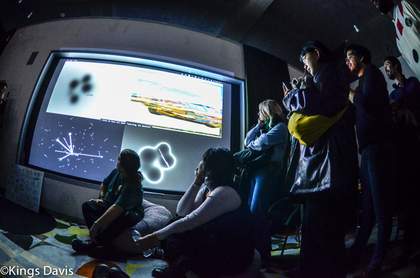
Documentation of Electronic Life at Late at Tate Britain, London, 2023, Photo © Kingsley Davis
Project aims
Electronic Life explored how emerging AI technologies intersect with access, identity and representation in the context of the national art collection. Set within Tate Britain, the project brought together social practice, critical design and generative AI to consider authorship, agency, cultural participation and the decolonisation of the museum.
From October 2023 to October 2024, Electronic Life unfolded as a programme of co-designed workshops, installations and public events at Tate Britain’s Digital Studio. Led by Professors Sunil Manghani and Ed D’Souza, the project collaborated with Tate Collective Producers and community partners including Element, a youth-led arts and social-action collective supporting care leavers, and Peckham Soup Kitchen, a Southwark-based organisation supporting young people through food provision and mentoring.
Participants from Element and Peckham Soup Kitchen engaged with AI image and voice tools to explore cultural heritage, creative agency and technological change. Highlights included Electronic Life public programming for Late at Tate Britain, featuring interactive installations and interactive AI entities developed through the workshops. An intensive two-day workshop, Patterns of Power, responded to the Women in Revolt! exhibition through experimental data-mapping, storytelling and the public presentation of ‘Rage Machine’ – an AI entity able to hold free and open conversation about the exhibition and its critical themes.
Electronic Life foregrounds collaborative, ‘makerly’ experimentation as a way to critically engage with AI. It supports a broader reimagining of the Digital Studio as a space for exploring the social and symbolic dimensions of machine-assisted vision and speech in public culture. A key outcome has been a new, institutional resource, ‘Listening Machine’ – an open-source, AI-powered interface able to intelligently gather a full range of voices from workshop exchanges, empowering community-based learning.
Tate Britain Voices x Peckham Soup Kitchen
A four-channel sound installation was developed in partnership with Peckham Soup Kitchen. Over twelve weeks, fourteen participants collaborated with the Electronic Life project to explore AI technologies through weekly walks and conversations at Tate Britain. Their candid, unscripted recordings – capturing jokes, debates and reflections – were transcribed and re-voiced using AI, raising critical questions about authorship, voice and authority. The work documents a co-designed process of movement, expression and shared presence within the gallery, and was presented for the first time as part of Museum x Machine x Me (part of Towards a National Collection, TaNC) programme, funded through the AHRC project, Transforming Collections: Reimagining Art, Nation and Heritage.
Project Partners
Electronic Life was developed through the project Research Studio Electronic Life led by Professors Sunil Manghani and Ed D’Souza with specialist AI engineering input from Tom Savage.
Project support from: Lucia Cipolina Kun, Deema (aka Dillon Roe-Edema), Léllé Demertzi, Hannah Redler-Hawes, Julie Freeman, Whiskey Chow, Kingsley Davis, Jud Mohammed (Peckham Soup Kitchen), Innes Eccles (Element), Lydia Paulett (Element), Luli Fukukawa, Amber Anderson, Linsey Young (Curator of Women in Revolt!, Tate Britain), Mind the Film, University of Southampton, the Alan Turing Institute, Web Science Institute, Element and Peckham Soup Kitchen.
Funders
Electronic Life was funded by the Arts and Humanities Research Council (AHRC) Impact Acceleration Account (IAA) which is a strategic funding initiative aimed at accelerating the impact of arts and humanities research, particularly beyond academic settings. Southampton Institute for Arts and Humanities Higher Education Innovation Funds and Web Science Institute Pilot Funding.
Find out more
Robert E. D’Souza and Sunil Manghani, 'Learning The Machine', Times Higher Education, November 2023.
Robert E. D'Souza & Sunil Manghani, eds. 'AI & Arts: People-Centre Practice.' Special Issue, Journal of Visual Art Practice, vol.24, no.4, October 2025.
